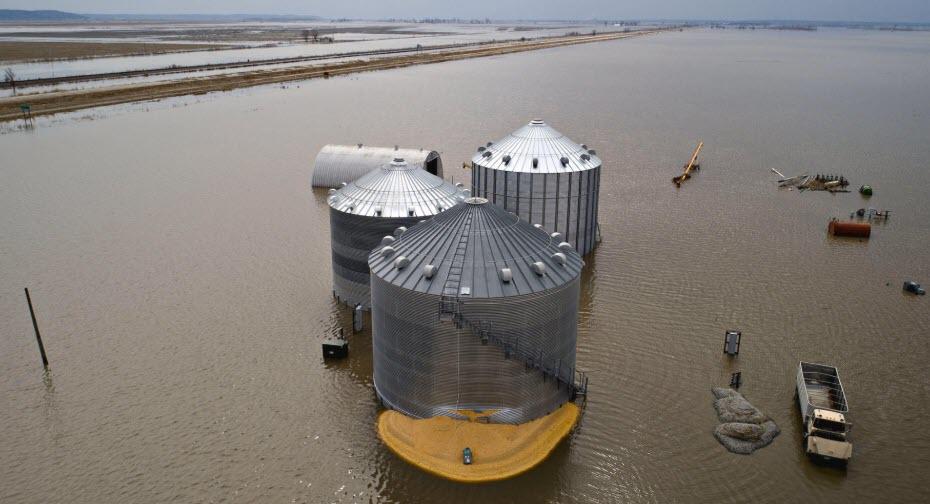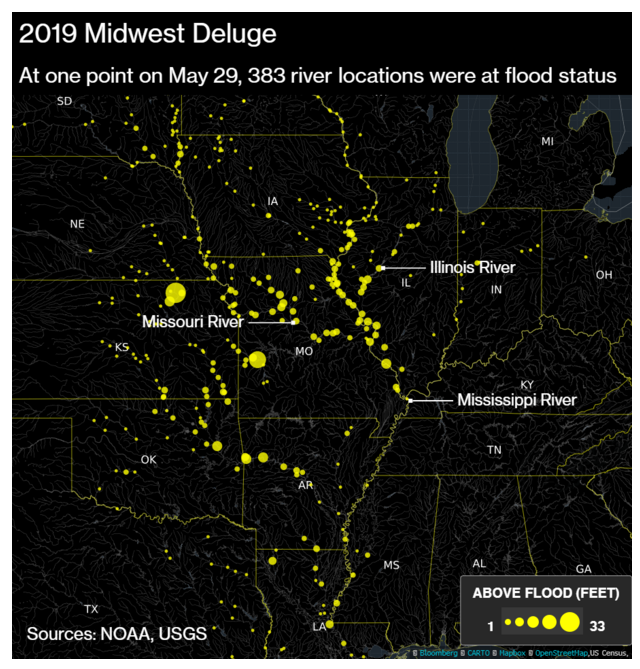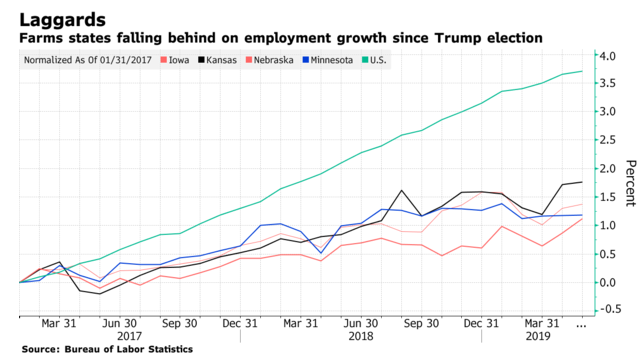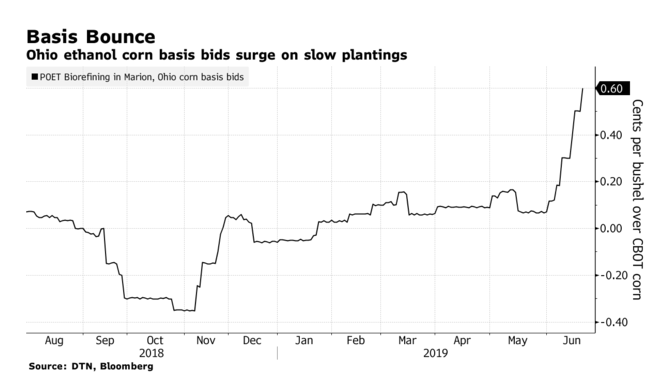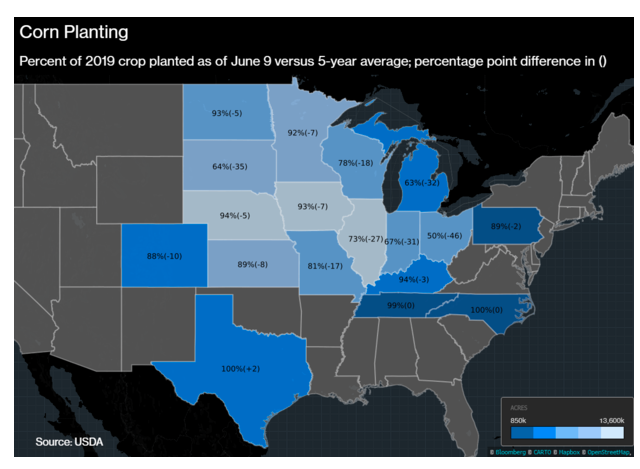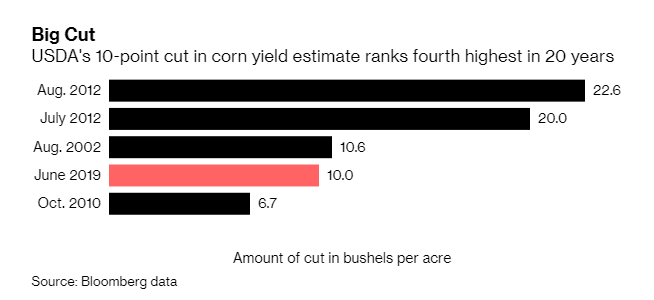The wettest year in memory continues to decimate corn crops across the midwest, according to Bloomberg.
And it’s not just farmers that are bearing the brunt of the flooding, it’s the entire agricultural economy. Those that provide supplies like seeds, fertilizer, equipment and services are also struggling. For example, BBG reports that “at Burrus Seed in Arenzville, Illinois, employees spend as much time trying to lift farmers’ spirits as they do selling to them.”
Todd Burrus, owner, said:
“If we experienced a year like this, I don’t remember it. When the farm economy is tough, it’s going to be tough for all the suppliers.”
Other Illinois seed business owners echo those sentiments. For instance, business owner Kurt Barman said that he’s being inundated with returns:
“All of the seeds are coming back, so that’s lost revenue for us.”
Now, growers don’t know whether to trade up to newer technology to protect crops and business, or use prior versions. Mark Patrick, chief financial officer of agro-chemical giant Syngenta AG said:
“Couple that with less acres, you’ve got a very acute pressure going on at the moment.”
Those in the fertilizer business have seen urea premiums running at more than double normal levels. The reason for the surge is due to the Mississippi being closed and and the normal flow of crop-nutrient shipments being disrupted.
It’s now being postulated that even the coming $28 billion in tariff aid may not be enough to rescue the Midwest from compounding negative catalysts.
Agricultural credit conditions have also steadily deteriorated. According to the Kansas City Federal Reserve and a Purdue University/CME Group index, “farmer sentiment has plunged to levels not seen since October 2016, the month before Donald Trump’s election victory.”
Net farm income last year came in at about half of the $123 billion earned in 2013. Curt Hudnutt, head of North American rural banking for Rabobank said:
“If you want to liken it to the 2008 recession from a housing perspective, it’s similar to that and it’s really vulnerable to any disruptions.’’
Shawn Kelly, mayor of Missouri Valley, Iowa, said: “The weather is casting a shadow over the corn-driven local economy, where average incomes are already well below the national average. Any time you have a big economic impact from agriculture like that where people can’t get their crops in, there’s going to be less money for people to spend.”
Hamburg, Iowa was inundated with flooding from the Missouri river and has had to take on debt to recover and reconnect water and gas supplies to homes. Mayor Cathy Crain said:
“We used to have a really healthy bottom line. As of two months ago, we have spent it all and are now living on and operating on borrowed dollars.”
There are some limited silver linings: corn futures have rallied about 30% since early May, which means that those who are able to grow will get higher prices. And worries of a poor corn crop have “prompted ethanol plants and animal feeders to bid more aggressively for supplies leftover from last year.”
Philip Luce, a grain merchandising specialist at advisory service White Commercial Corp. in Stuart, Florida said: “In terms of the effect on the old crop, both price and basis, it’s been a godsend. Unfortunately, usually you get these prices when there’s a production problem.’’
Craig Woodley, a pilot who owns Woodley Aerial Spray in Walnut, Illinois, said:
“It’s a scary picture. There’s definitely going to be a lot of lives affected.”
Recall, about a week ago, we wrote that farmers were expecting a corn crop far worse than USDA estimates. We wrote that farmers believed that already adjusted estimates for June were still going to be too optimistic. Our report checked in with corn farmer James McCune, who, when looking at the size of his diminutive corn crop this year simply said: “Corn’s not supposed to be this tall.”
In fact, we noted that conditions and morale are so poor in Northwestern Illinois, McCune organized a happy hour for about 125 farmers and others tied to the industry. They called it the “Prevent Plant Part”, a nod in jest to the unplanted acreage this season.
“It’s going to be a train wreck,” McCune said.
Corn farmers face unprecedented headwinds this year, including record rain that has flooded the midwest and stalled corn plantings. This has forced the US Department of Agriculture to cut its harvest estimates in its June report. This is only the fourth time since 2000 that the government has taken such action in the month of June.
McCune says that the USDA’s report won’t even capture how bad this year‘s crop will be. Another farmer, Bryan Snetcher, said even though he was able to get his crop planted, it has been a huge battle.
via ZeroHedge News https://ift.tt/2Ja3TiB Tyler Durden
